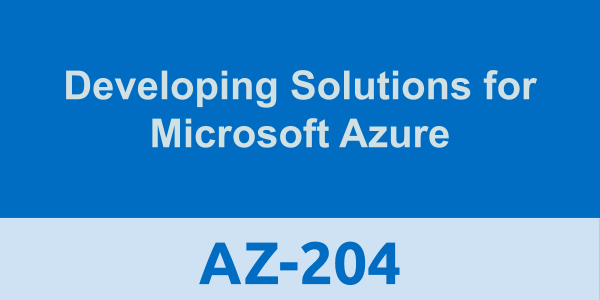As a candidate for this exam, you’re responsible for participating in all phases of development, including requirements gathering, design, development, deployment, security, maintenance, performance tuning, and monitoring.
You should be proficient in Azure:
◉ SDK
◉ Data storage options
◉ Data connections
◉ APIs
◉ App authentication and authorization
◉ Compute and container deployment
◉ Debugging
To implement solutions, you partner with:
◉ Cloud solution architects
◉ DBAs
◉ DevOps
◉ Infrastructure admins
◉ Other stakeholders
As a candidate, you should have at least two years of professional development experience and experience with Azure. You should be:
◉ Able to program in an Azure-supported language.
◉ Proficient using Azure CLI, Azure PowerShell, and other tools.
Microsoft Developing Solutions for Azure Exam Summary:
| Exam Name | Microsoft Certified - Azure Developer Associate |
| Exam Code | AZ-204 |
| Exam Price | $165 (USD) |
| Exam Price | 120 mins |
| Number of Questions | 40-60 |
| Passing Score | 700 / 1000 |
| Sample Questions | Microsoft Developing Solutions for Azure Sample Questions |
| Practice Exam | Microsoft AZ-204 Certification Practice Exam |
Microsoft AZ-204 Exam Syllabus Topics:
| Topic | Details |
| Develop Azure compute solutions (25-30%) | |
| Implement containerized solutions | - Create and manage container images for solutions - Publish an image to Azure Container Registry - Run containers by using Azure Container Instance - Create solutions by using Azure Container Apps |
| Implement Azure App Service Web Apps | - Create an Azure App Service Web App - Enable diagnostics logging - Deploy code to a web app - Configure web app settings including Secure Sockets Layer (SSL), API settings, and connection strings - Implement autoscaling |
| Implement Azure functions | - Create and configure an Azure Function App - Implement input and output bindings - Implement function triggers by using data operations, timers, and webhooks |
| Develop for Azure storage (15-20%) | |
| Develop solutions that use Azure Cosmos DB | - Perform operations on containers and items by using the SDK - Set the appropriate consistency level for operations - Implement change feed notifications |
| Develop solutions that use Azure Blob Storage | - Set and retrieve properties and metadata - Perform operations on data by using the appropriate SDK - Implement storage policies and data lifecycle management - Implement static site hosting |
| Implement Azure security (20-25%) | |
| Implement user authentication and authorization | - Authenticate and authorize users by using the Microsoft Identity platform - Authenticate and authorize users and apps by using Microsoft Entra ID - Create and implement shared access signatures - Implement solutions that interact with Microsoft Graph |
| Implement secure Azure solutions | - Secure app configuration data by using App Configuration or Azure Key Vault - Develop code that uses keys, secrets, and certificates stored in Azure Key Vault - Implement Managed Identities for Azure resources |
| Monitor, troubleshoot, and optimize Azure solutions (15-20%) | |
| Implement caching for solutions | - Configure cache and expiration policies for Azure Cache for Redis - Implement secure and optimized application cache patterns including data sizing, connections, encryption, and expiration - Implement Azure Content Delivery Network endpoints and profiles |
| Troubleshoot solutions by using Application Insights | - Configure an app or service to use Application Insights - Monitor and analyze metrics, logs, and traces - Implement Application Insights web tests and alerts |
| Connect to and consume Azure services and third-party services (15-20%) | |
| Implement API Management | - Create an Azure API Management instance - Create and document APIs - Configure access to APIs - Implement policies for APIs |
| Develop event-based solutions | - Implement solutions that use Azure Event Grid - Implement solutions that use Azure Event Hub |
| Develop message-based solutions | - Implement solutions that use Azure Service Bus - Implement solutions that use Azure Queue Storage queues |





0 comments:
Post a Comment